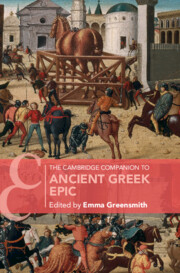Book contents
- The Cambridge Companion to Ancient Greek Epic
- The Cambridge Companion to Ancient Greek Epic
- Copyright page
- Contents
- Figures
- Contributors
- Preface
- Introduction
- Part I Epic Engagements
- Part II Epic Space
- Part III Epic Time
- Part IV Epic People
- Part V Epic Feelings
- Part VI Epic Without End
- 17 Ancient Readers of Greek Epic
- 18 Greek Epic in a Christian Empire
- 19 The Fates of Epic in Byzantium
- 20 Homeric Epic and Nation-Building in Modern Greece and Turkey
- 21 Ancient Greek Epic and the Cinema
- Epilogue
- Timeline of Ancient Greek Epic
- Bibliography
- Index Locorum
- Subject Index
- Cambridge Companions To Literature
18 - Greek Epic in a Christian Empire
Grit in the Eye
from Part VI - Epic Without End
Published online by Cambridge University Press: 04 December 2024
- The Cambridge Companion to Ancient Greek Epic
- The Cambridge Companion to Ancient Greek Epic
- Copyright page
- Contents
- Figures
- Contributors
- Preface
- Introduction
- Part I Epic Engagements
- Part II Epic Space
- Part III Epic Time
- Part IV Epic People
- Part V Epic Feelings
- Part VI Epic Without End
- 17 Ancient Readers of Greek Epic
- 18 Greek Epic in a Christian Empire
- 19 The Fates of Epic in Byzantium
- 20 Homeric Epic and Nation-Building in Modern Greece and Turkey
- 21 Ancient Greek Epic and the Cinema
- Epilogue
- Timeline of Ancient Greek Epic
- Bibliography
- Index Locorum
- Subject Index
- Cambridge Companions To Literature
Summary
This chapter probes the powerful presence of Greek epic in the world of late antique Christianity. The chapter begins by exploring the dynamic variety of uses to which hexameter verse was put by late antique Christians, including poems on surprisingly salacious themes. It then turns to consider hexameter poems on specifically Christian topics. First it examines the earliest examples of such texts, the Sibylline Oracles and the poems in the Codex of Visions. He then analyses the group of poems all composed in the fifth century CE: the Metaphrase of the Psalms of ps.-Apollinaris, the Homeric Centos and Martyrdom of St Cyprian of Eudocia and the Paraphrase of John’s Gospel by Nonnus. Each of these is, in a different way, a transcription into hexameter verse of a pre-existing Christian text — a striking development in the history of Greek poetry. Whitmarsh shows how this shift enacts, and indeed puts pressure on, the distinction between form and content. Yet for all that they have in common, each of the three fifth-century poets has a different agenda, and reflects a unique poetic vision and aesthetic.
Keywords
- Type
- Chapter
- Information
- The Cambridge Companion to Ancient Greek Epic , pp. 381 - 399Publisher: Cambridge University PressPrint publication year: 2024

